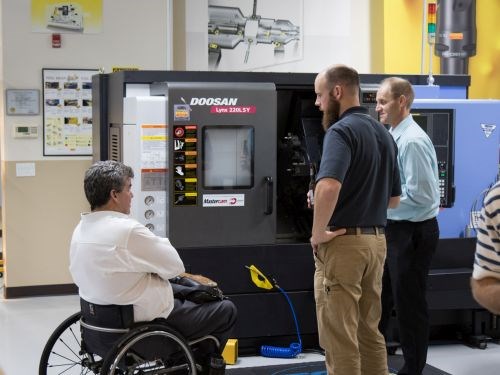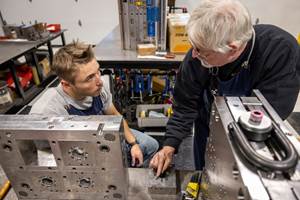Collaboration with Education: It All Comes Full Circle
There's a growing interest among instructors who work in the Illinois education system to bring back "shop-type" classes and give students a taste of what modern, advanced manufacturing careers offer for enterprising youth.

Geoff Luther, left, president of A-1 Tool Corp., discusses the advantages of manufacturing training programs and viable career options in moldmaking with Chicago area educators during the AMBA Chicago's recent education symposium.
When the American Mold Builders Association (AMBA) Chicago Chapter wrapped up its second education symposium for 2016 there was a definite feeling of accomplishment because new connections for collaboration were established with instructors from several high schools and junior colleges who attended to learn about careers in advanced manufacturing.
Chuck Klingler of Janler Corporation in Chicago opened the event, which was held at the Technology and Manufacturing Association in Schaumburg, Illinois, describing how he came to work in the moldmaking industry, and expressing his passion for it and the excitement, technologies, and people that make it such a rewarding career. He also introduced the evening’s other speakers, including Keynote Nick Polyak, superintendent of Leyden High School District 212, who returned to present an amazing update on the school’s overwhelmingly popular manufacturing curriculum. Last year, Polyak told attendees about the success of its manufacturing technology classes at its East Leyden campus. This year he shared how, because of the overwhelming success at East Leyden, a second program has been established at its West Leyden campus, and that both campus’ classes are filled to the limit.
“He said most of the kids who go through the manufacturing courses graduate and get jobs right away,” Francine Petrucci, AMBA Chicago president, says. “He talked about how years ago, the original machine shop at Leyden was converted into a weight room because shop classes experienced very low enrollment, but all of that has changed and that weight room is now a new manufacturing technology center at Leyden's west campus. He credited the businesses who partner with the district and serve on advisory boards that guide the curriculum for the success of the classes. Those classes help to make these kids viable, skilled employees of the companies that pay taxes to the school district that help support the programs. He said it all comes full circle—and I agree that it does.”
In addition to roundtable discussions with moldmaker apprentices and shop owners, a guided tour of the TMA’s training facility to see modern, high-tech machining centers and other equipment as well as how well-lit and clean today’s manufacturing environment is. The video “Mold Making: Your Road to Success” was shown to give educators an overview of the moldmaking profession, and it was also provided on complimentary AMBA flash drives so that the teachers could take show video to their students and fellow educators.
“Many of the teachers remained at least 45 minutes after the symposium ended to exchange business cards with each other and with the AMBA and TMA representatives and ask questions,” Petrucci says. “They were also glad to learn that Chicago AMBA members and partner members would be willing to donate some needed supplies like steel and end mills for their classrooms. Within a day or two, some teachers emailed lists of needed items so that we could give them a hand.”
Panos Hadjimitsos, assistant dean of Science, Business, and Computer Technology at Moraine Valley Community College in Palos Hills, Illinois, contacted the AMBA to obtain permission to air the Road to Success video on monitors in its technology center on campus and at the college’s two satellite locations. “I watched the video on the flash drive a couple of times,” he said. “In the technology building, I have access to several large-size flat monitors streaming content from 7 a.m. until 11 p.m. and I would like to display the video at key times and gauge the response it will generate.” He said he also wants to show it at high schools and middle schools in Moraine's school district, explaining that there is interest in bringing about a “rebirth of machining” in the Moraine Valley school system.
“The engagement and conversation was excellent,” Klingler says. Simply stated and echoes, in a way, what Polyak said about things coming full circle. This group of American mold builders puts a lot of time and effort into these events because they are excited and passionate about what they do and they want to make it infectious. Collaborating with educators and their students, inviting them into their shops and training facilities, offering a variety of career paths to achieve a place in this important industry are all ways they are making it happen and I think that’s impressive.
Related Content
How to Improve Your Current Efficiency Rate
An alternative approach to taking on more EDM-intensive work when technology and personnel investment is not an option.
Read MoreConfronting the Mold Design Talent Drought
Recently, I reposted on LinkedIn the results of an informal survey we conducted, which revealed a shortage of skilled mold designers. It quickly gained a lot of traction. Given the response, I thought I'd summarize the feedback and keep the conversation going.
Read MoreUnique Mold Design Apprenticeship Using Untapped Resources
To help fill his mold design skills gap, Jeff Mertz of Anova Innovations, is focused on high schools and underprivileged school districts, a school that has lower graduation and college entrance rates. The goal is a student-run enterprise.
Read MoreEden Tool and Eden Manufacturing: A Story of Resilience, Growth and Innovation
This critical parts manufacturer, founded on solid tooling fundamentals, didn’t get derailed with the unexpected passing of the owner because leadership was already building a solid business, not just a good tool shop. Here’s how they managed change incrementally… and they’re not finished yet.
Read MoreRead Next
How to Use Strategic Planning Tools, Data to Manage the Human Side of Business
Q&A with Marion Wells, MMT EAB member and founder of Human Asset Management.
Read MoreAre You a Moldmaker Considering 3D Printing? Consider the 3D Printing Workshop at NPE2024
Presentations will cover 3D printing for mold tooling, material innovation, product development, bridge production and full-scale, high-volume additive manufacturing.
Read MoreHow to Use Continuing Education to Remain Competitive in Moldmaking
Continued training helps moldmakers make tooling decisions and properly use the latest cutting tool to efficiently machine high-quality molds.
Read More





















